Over the last four years, I have been leveraging two different models when helping to elevate leaders and executives to operate a higher levels:
- My mindset framework, which I cover in my book, Success Mindsets
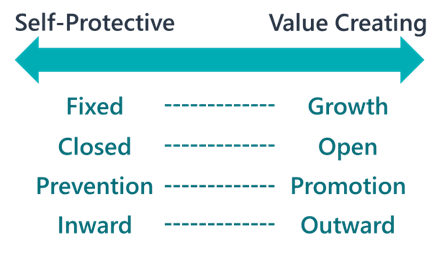
- My vertical development framework, which I cover in my book, The Elevated Leader
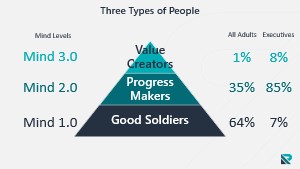
Both of these frameworks help leaders and executives to:
- Awaken to the current quality of their internal operating system
- Identify the next level and focus for becoming a more elevated leader
- Get clarity about how to go about elevating
Across my experience leveraging these two frameworks, I have observed patterns of how leaders’ mindsets differ across the different mind levels. And, in this article, I want to share what I generally see.
Primarily Mind 1.0 Leaders
When I work with organizations where they have a high proportion of Mind 1.0 leaders, I generally find that they are:
- Primarily focused on ensuring current and ongoing comfort (over results or purpose)
- Wants to create an environment that feels like “family”
- Very risk and problem avoidant
- Spending a lot of time playing the role of “firefighter,” running around putting out fires
- Slow to change and adapt
From a mindset perspective, here is what I generally find:
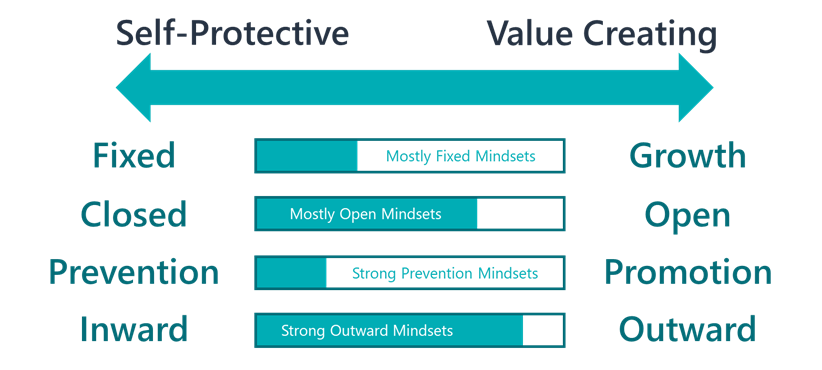
This mindset profile generally means that these leaders:
- Operate from a place of fear (fear of looking bad and having problems; fixed and prevention mindsets, respectively)
- Care about making the environment comfortable (open and outward mindsets)
- Because they aren’t driven by growth, purpose, and progress, they largely operate as dependent thinkers. As such, they don’t operate as drivers of the ship, but more firefighters in the ship.
Primarily Low Mind 2.0 Leaders
When I work with organizations where they have a high proportion of leaders on the lower end of Mind 2.0, I generally find that they:
- Strongly focus on their own personal success (over comfort and purpose)
- Create a very competitive (and often toxic) work environment
- Are very results- and outcome-focused
- Are short-term oriented and have a hard time thinking into the future and being strategic
- Are reactive
- Create a rigid top-down hierarchical structure
From a mindset perspective, here is what I generally find:
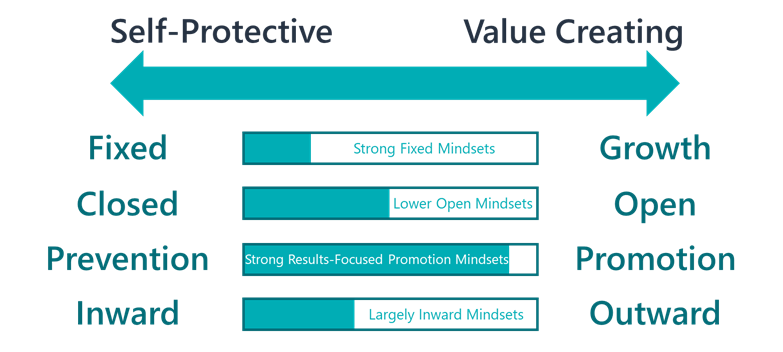
This mindset profile generally means that these leaders:
- Are strongly focused on hitting results in the short-term (results-focused promotion mindset)
- Are afraid of trying new things because doing something new feels less sure (fixed mindset)
- Care more about results than about people (lower open mindset and largely inward mindset)
- These leaders are generally independent thinkers who believe that they have all the answers and are focused on accomplishing results their way.
Primarily High Mind 2.0 Leaders
When I work with organizations where they have a high proportion of leaders on the higher end of Mind 2.0, I generally find that they:
- Are focused on collective success (over comfort and purpose)
- Are strongly results- and outcome-focused
- Do not create a healthy accountability culture
- Have a culture with top-down decision making and those below the executive level struggle to take initiative and make decisions themselves
- Are short-term oriented and generally don’t have clarity on mission, vision, and values (or, if they do, they are strongly oriented around results and outcomes)
- Are reactive and are driven more by external approval than an internal purpose
From a mindset perspective, here is what I generally find:
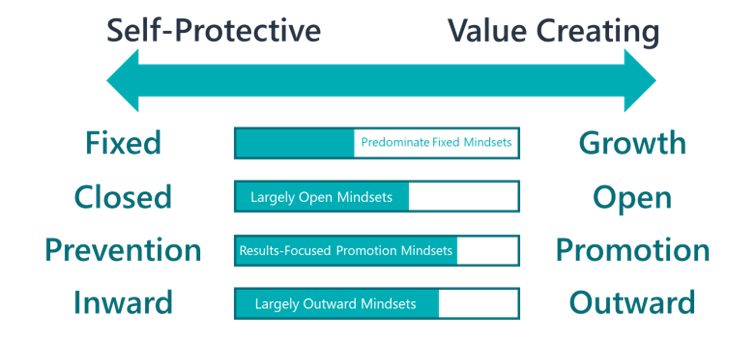
This mindset profile generally means that these leaders:
- Are strongly focused on hitting results in the short-term (results-focused promotion mindset)
- Struggle to try new things because doing something new feels less sure (fixed mindset)
- Care more about collective success and results (largely outward mindsets)
- Create a moderate psychologically safe environment (open and outward mindsets)
Primarily Mind 3.0 Leaders
When I work with organizations where they have a high proportion of leaders on the higher end of Mind 3.0, I generally find that they:
- Are focused on fulfilling a meaningful purpose (over comfort and results)
- See results and outcomes as measures of the degree to which they are fulfilling their purpose
- Create a healthy accountability culture through the establishment of clear, inspirational, and stakeholder-centric purpose, mission, vision, and values statements
- Lead with context and have an empowering culture
- Are long-term oriented and have the ability to be willing to take risks or fail in the short-term because they recognize that doing so sets them up for longer-term success
From a mindset perspective, here is what I generally find:
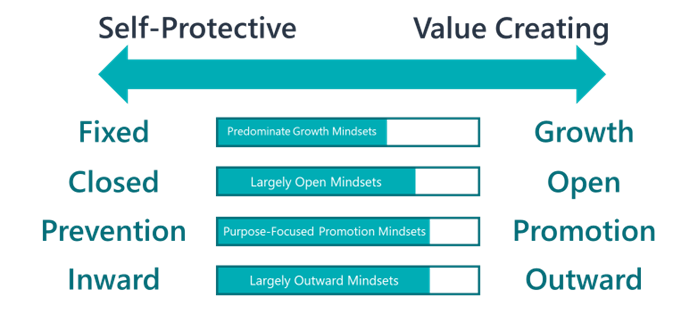
This mindset profile generally means that these leaders:
- Are strongly focused on fulfilling a purpose in the long-term (purpose-focused promotion mindset)
- Are gardener-minded leaders (they are focused on creating the right conditions for their employees to grow and thrive; outward mindset)
- They are willing to try new things and approach risk as a way to continue to learn and grow toward the fulfillment of their purpose (growth and purpose-focused promotion mindset)
- Create an empowering and psychologically safe environment (growth, open and outward mindsets)
Now Consider…
- What best describes your leaders?
- Do you want to assess the mindsets of your leaders to get a better sense of where your organization’s leadership culture?
- Do you want to work with me to help elevate your organization’s leadership culture? If so, connect with me here.











One Response
We are struggling with accountability but I think it goes back to an unclear purpose. I think if we clarified that it would go a long way towards improved understanding of expectations.